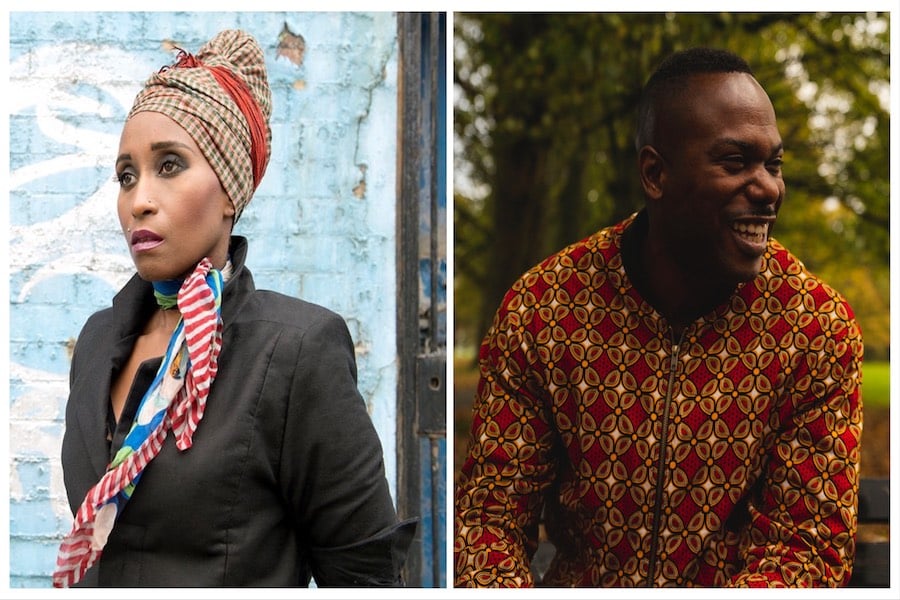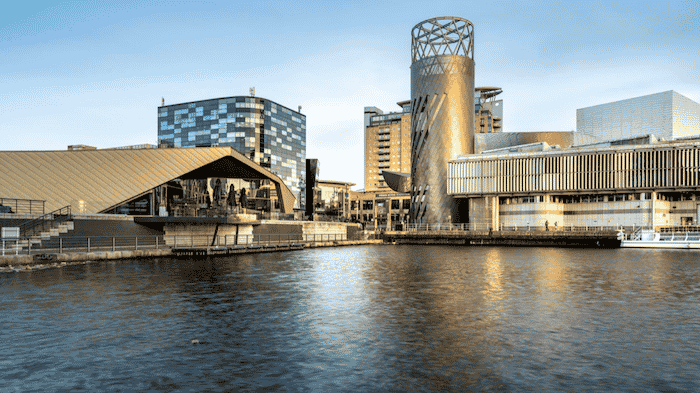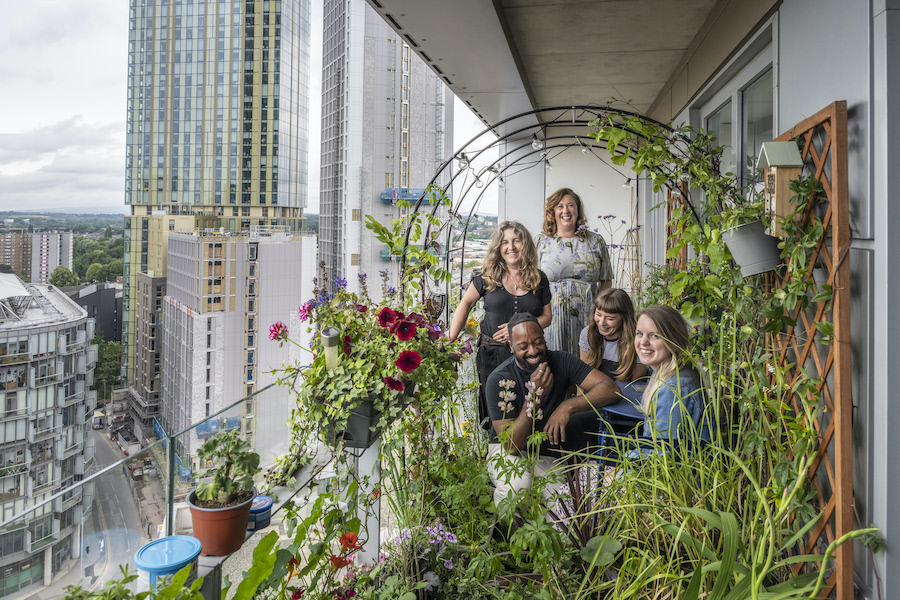Meet the remarkable Manchester poets nominated for prestigious Forward Prize
- Written by Thom Bamford
- Last updated 1 year ago
- Books, People

For a city that made its name in science and industry, Manchester punches well above its weight in producing fantastic artists, musicians and poets. You can meet the Manchester poets who are defining the city through the power of poetry. But they haven’t all been nominated for a prestigious Forward Prize.
From the industrial anthems of the past to the contemporary verses that echo through its streets today, this region has consistently produced voices that resonate far beyond its borders.
Lemn Sissay, Tony Walsh with his moving This Is The Place, ARGH KiD and Manchester’s Sprawling, Michael Symmons Roberts’ collection Mancunia which was shortlisted for the TS Eliot Prize – and of course John Cooper Clarke’s incredible body of work, among many others, have not only captured the spirit of Greater Manchester but have also left an indelible mark on the world of poetry.
Once famous for cotton mills and railways, it is also renowned for the verses and stanzas that flow through its streets.
Two amazing poets have been nominated for the very prestigious Forward Prize, celebrating poetic excellence that encapsulates the very essence of the UK and Ireland’s poetic spirit.
Each year, the Forward Prizes shortlist poets and their works in these categories, highlighting outstanding contributions to contemporary poetry.
The shortlists reflect diverse themes, styles, and voices, making them an essential recognition in the poetry world.
The 2023 shortlists include poets from various backgrounds and explore a wide range of topics and forms, showcasing the vibrant state of contemporary poetry.
The winners will be announced at a ceremony in Leeds Playhouse as part of Leeds 23 on October 16, 2023. The Forward Prizes have a rich history of celebrating established and emerging poets, and the winners often go on to make significant contributions to the literary world.
In this feature, we delve into the lives, inspirations, and journeys of these remarkable wordsmiths, Malika Booker and Jason Allen Paisant, who captivate readers with their evocative verses.
Both work at Manchester Metropolitan University and University of Manchester, and are putting the city on the literary map.
Malika Booker: Cultivating Poetry and Identity
As a co-founder of Malika’s Poetry Kitchen, you’ve been involved in nurturing emerging poets. How has this experience impacted your own creative process and approach to writing?
Nurturing and mentoring poets challenges me to be knowledgeable enough to articulate my approach to both the process and poetics of writing.
The developmental process is often an exchange of knowledge between myself and the writers I am nurturing, which means that it is important that I always skill up in a variety of poetics and styles of writing – i have had to learn about poetics from a variety of cultures from Urdu to Somali in order to facilitate a particular poets growth and this inevitably feeds into my own work.
“Libation” is a powerful poem that draws from African and Caribbean rituals. Could you share a bit about the inspiration behind this poem and how your cultural background informs your poetic style?
I employ an Caribbean diasporic poetic – which traces its muse from the culture, vernacular and rituals formed in the Anglophone Caribbean, (namely Guyana and Grenada) to its transnational journeys with the Caribbean migratory diaspora who settled in Britain (Brixton), and New York (Brooklyn).
The poem is in response to and in conversation with the African American poet Kevin Young’s poem ‘Dreams the Day after Easter’. At the moment I am working on a collection thinking about Caribbean funerary and wake traditions, in particular the Nine Nights wakes and the altars we erect to communicate with our ancestors.
One of the particular preoccupations of the poem is the ceremonial libation – where we pour alcohol to appease and pay tribute to our ancestors.
I was struck by how ritualistic actions can continue being enacted even though the participants do not know or understand the tradition. I was also thinking about the increase in knife crime across inner cities in Britain (from London, to Leeds, Birmingham etc) and the young men pouring alcohol at these funerals – with no cultural content.
I suppose this poem is a rumination on what we pass on.
Manchester is known for its vibrant arts scene. As a Creative Writing lecturer at MMU, how has the city’s atmosphere and cultural diversity influenced your teaching and your own creative work?
I love working in the Writing School in Manchester Metropolitan University with some of the most talented creative writers: Prize winning poets like Andrew McMillian and Kim Moore , playwrights like Anjum Malik, then in the Manchester Poetry Library there are amazing minds like Becky Swain, Martin Kratz, Kaye Tew, Roma Havers and Ruth Awolola – who all make the work environment exciting. engaging with their commitment to the creative development of our students, our writers and the community.
This is the heartbeat of our purpose in the writing school and the Manchester Poetry Library.
I have been inspired by the work of these colleagues, who have enabled me to work with NHS workers – celebrating Windrush, take part in Translation school projects like Mother Tongue, Other tongue, and The Poets of Colour Incubator Programme – a developmental programme for poets of colour in the North.
Manchester is such a creative space for literature, theatre and music – that the shows, the exhibitions in the museums all feed into my creative practice.
Two amazing literature initiatives that showcase first class talents, whose programming has influenced my work are Manchester Literature Festival and Manchester International Festival.
Your poetry often explores themes of heritage and identity. How has your Guyanese and Grenadian background influenced the themes you choose to write about in your work?
My early childhood memories were formed in Guyana, I also remember when I lived in Brixton – being told when I returned home from school and shut then front door that I was entering Grenada.
So home was Grenada and everything Grenadian, food, rituals, vernacular. Because of this I have a strong Caribbean identity that shaped my poetics.
I am also a diasporic child, with my nuclear family divided between New York (Brooklyn) and Britain (Brixton) – this strong Caribbean diaspora shaped my poetic aesthetic.
Which is impacted by the legacies of colonialism – recently (the Windrush Scandal). I am also very interested in what we inherit – so the work is inevitably intergenerational.
And as a Black Women I am interested in how the legacy of colonialism is enacted on the black female body and how we as women navigate these patriarchal, racial and cultural prejudices.
I write in conversation with a rich black literary tradition – mainly African American and Caribbean as well as in conversation with past and contemporary British poets like William Blake and Mimi Khalvati.
One of my latest preoccupations is how my work and that of other contemporary Black writers is helping to shape a Black British poetic.
This includes writers like Karen McCarthy Woolf, Roger Robinson. Yomi Sode, Raymond Antrobus, Momtaza Mehri, Denise Saul, Jason Allen Paissant, and Victoria Adukwei Bulley.
Any advice to budding poets?
Read, Read, read.
You cannot write if you don’t read.
Read poets from the past as well as the present. Read internationally, historically.
Read craft books.
Making reading part of your desk work.
Also try to write something everyday.
Get into a ritual of a daily writing practice where the desk is a space of experiment, a place to fail and not only a space to produce a poem.
Watch and read as much about the art and craft of writing as you can.
Submerge yourself in poetry – a good starting point is to begin with poetry anthologies.
Jason Allen Paisant: Exploring Identity on Stage and Page
“Self Portrait as Othello” addresses complex themes of identity, migration, and the Black male body. Could you discuss the significance of using Othello’s character as a lens to explore these themes?
Othello is a theatrical work, as we know, but I was also thinking of the character Othello as an actor.
Within the world of the play, he’s a performer: for the Venetian aristocrats, for the city, for Desdemona (for whom his greatest quality is his storytelling); he’s being watched, but he’s also—I imagine—watching the others watch him.
As a racialized other, outsider, performer, there’s that experience of constantly seeing yourself being seen, and I wanted to take a deep dive into how Othello might respond to that.
I have no doubt that he was also watching, and that’s the side of him that we don’t see imagined in Shakespeare.
This idea of acting/watching/being watched became such a thinking point that the character turned into a container mechanism for looking at these issues of migration, racialization and the body that you mention.
The story became embodied: I felt the story itself becoming like a real body.
Your collection “Thinking with Trees” won the OCM Bocas Prize for poetry. How does the natural world, as evidenced in this collection, intersect with the themes of identity and self-exploration in your poetry?
There’s a continuity of course: again, in Thinking with Trees, performing/watching/being watched is a major concern.
I didn’t realise how much of a continuity there was; I was working unconsciously, as we often do.
Only late in the game was I able to stand back and view the red thread of performance, viewing realities, seeing and being seen, the Black body… And yet Thinking with Trees was a book about trees, ecology, and ‘nature’; that should say much.
In your role as a senior lecturer in Critical Theory and Creative Writing, how do your academic pursuits complement your creative endeavours?
I have made the two one: ‘critical creativity’ is what I call it.
I no longer conceive of any diving wall whatsoever between them: all of my creative work is critical, and conversely, I decided a few years ago that all my critical work would be guided by poetic and artistic creativity.
“Scanning the Bush” seems to promise an intriguing exploration. Could you provide a glimpse into what readers can expect from this upcoming non-fiction work?
Scanning the Bush has now been retitled The Possibility of Tenderness: A Jamaican Search for Freedom in Nature.
Titles aren’t fixed until they’re affixed to the cover, but this new title is loved by my editor, myself, and many others.
It’s about how the world of plants and growing things might be an invitation to inhabit tenderness, an authorization to inhabit tenderness for vulnerabilised Black bodies; that said, I think it’s a book that will speak to readers of all backgrounds.
Tenderness eludes us so much in our societies because of violence, because of grind culture, and this book—which is a memoir sorts chronicling the relationship with my herbalist grandmother—is a search for a deep and essential tenderness in the world of plants and green, growing things.
- This article was last updated 1 year ago.
- It was first published on 11 September 2023 and is subject to be updated from time to time. Please refresh or return to see the latest version.
Did we miss something? Let us know: press@ilovemanchester.com
Want to be the first to receive all the latest news stories, what’s on and events from the heart of Manchester? Sign up here.
Manchester is a successful city, but many people suffer. I Love Manchester helps raise awareness and funds to help improve the lives and prospects of people across Greater Manchester – and we can’t do it without your help. So please support us with what you can so we can continue to spread the love. Thank you in advance!
An email you’ll love. Subscribe to our newsletter to get the latest news stories delivered direct to your inbox.
Got a story worth sharing?
What’s the story? We are all ears when it comes to positive news and inspiring stories. You can send story ideas to press@ilovemanchester.com
While we can’t guarantee to publish everything, we will always consider any enquiry or idea that promotes:
- Independent new openings
- Human interest
- Not-for-profit organisations
- Community Interest Companies (CiCs) and projects
- Charities and charitable initiatives
- Affordability and offers saving people over 20%
For anything else, don’t hesitate to get in touch with us about advertorials (from £350+VAT) and advertising opportunities: advertise@ilovemanchester.com

Here’s how you can make your moves matter for dementia awareness

£14.5m cultural and creative hub to ‘mark a new chapter’ for Stockport Town Centre

Now you can own a piece of TV history and support a much loved NHS Charity

Best bars and pubs to watch the football and live sport in Manchester

Discotheque Royale vs Piccadilly 21s: which was your favourite 90s Manchester club?
















